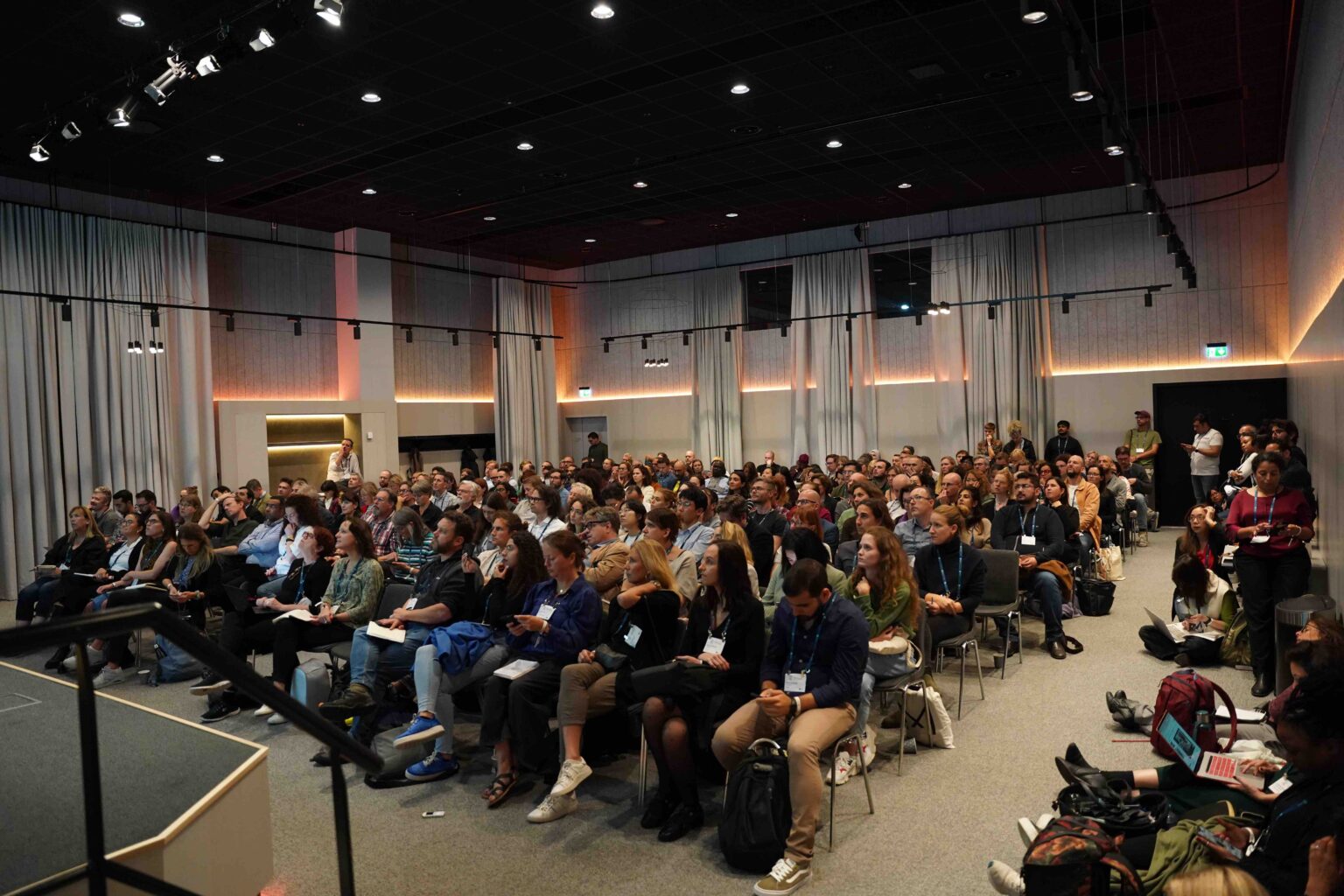…maximizing collaboration and technology for investigative journalism
The 13th Global Investigative Journalism Conference (GIJC23) brought together a historic number of journalists from various parts of the world to explore the evolving landscape of investigative journalism in a world marked by geopolitical shifts, technological advancements, and threats to democracy. Against this backdrop, Senator Iroegbu, who was one of the participants via a fellowship from the Global Investigative Journalism Network (GIJN) and MacArthur Foundation, writes that the conference illuminated key themes, including the power of collaboration, emerging surveillance threats, the role of investigative journalism in safeguarding democracy, and practical insights for journalists navigating complex challenges.
Summary
The Global Investigative Journalism Conference (GIJC) concluded its record-breaking 13th edition (#GIJC23) with over 2,100 journalists from 132 countries gathering in Gothenburg, Sweden. Against the backdrop of a changing world marked by a pandemic, global warming, geopolitical shifts, and advancements in artificial intelligence, the conference underscored the importance of collaboration and technology in the face of evolving challenges.
Emphasizing the need for collaboration, new GIJN Executive Director Emilia Diaz-Struck highlighted the challenging landscape investigative journalists navigate, with attacks, disinformation, and censorship. Despite these challenges, Diaz-Struck noted inspiring collaborations, the power of data, and the embrace of technology, shaping the narrative of hope amid adversity.
The conference delved into key topics, categorizing threats to press freedom and investigative journalism under areas such as technology, climate change, data journalism, women in the media, geopolitics, collaborative journalism, and democracy. Notable sessions addressed covert surveillance threats, the erosion of democracy worldwide, and the role investigative journalism plays in preserving democracies.
Collaboration took center stage, with a focus on investigative reporting saving democracies. Panelists stressed the fundamental watchdog role journalists play, going beyond political reporting to illuminate judicial independence, rule-breaking, marginalized groups, and hidden forces behind elections. The conference also explored investigating elections, offering insights into combating threats like AI, tech companies, echo chambers, and gender-based violence against journalists.
The importance of collaboration extended to sessions on following the money, where experts unveiled the intricate web of money laundering, urging investigative reporters to think like criminals. The conference spotlighted challenges faced by women in investigative journalism and explored the benefits of collaboration between journalists and scientists.
Summing up the conference, Diaz-Struck, in an exclusive interview, discussed the honor and responsibility of her role. She highlighted plans to support investigative journalism in Africa, enhance editorial training, and address emerging threats, emphasizing GIJN’s commitment to combat misinformation, promote transparency, and address global issues through collaboration and community engagement. The GIJC23, with its focus on collaboration and technology, provided a platform for journalists to navigate the complexities of the digital age while preserving the integrity of investigative journalism.
GIJC23 breaks records amid evolving challenges
In 2019, the GIJC hosted its last in-person event, setting the stage for an unparalleled gathering that unfolded in September 2023. The GIJC23 witnessed a historic congregation of 2,138 journalists from 132 countries at the Svenska Mässan conference center in Gothenburg, Sweden. A convergence of diverse voices, including fellows from the Global South and Indigenous investigative outlets, marked this record-breaking event.
Against a backdrop of geopolitical shifts, technological advancements, and global crises such as the pandemic, Russia’s invasion of Ukraine, the continuous impact of climate change, erosion of democracy and rising influence of authoritarian and autocratic regimes, the GIJC23 became a crucial platform for journalists to navigate an evolving landscape.
The conference’s thematic focus extended across a spectrum of critical subjects, including technology with a lens on Artificial Intelligence and Cyberthreats, Climate Change, Data Journalism, Women in the media, Geopolitics, collaborative journalism, and the intricate dynamics of democracy. It reflected a comprehensive exploration of the various facets threatening press freedom and investigative journalism.
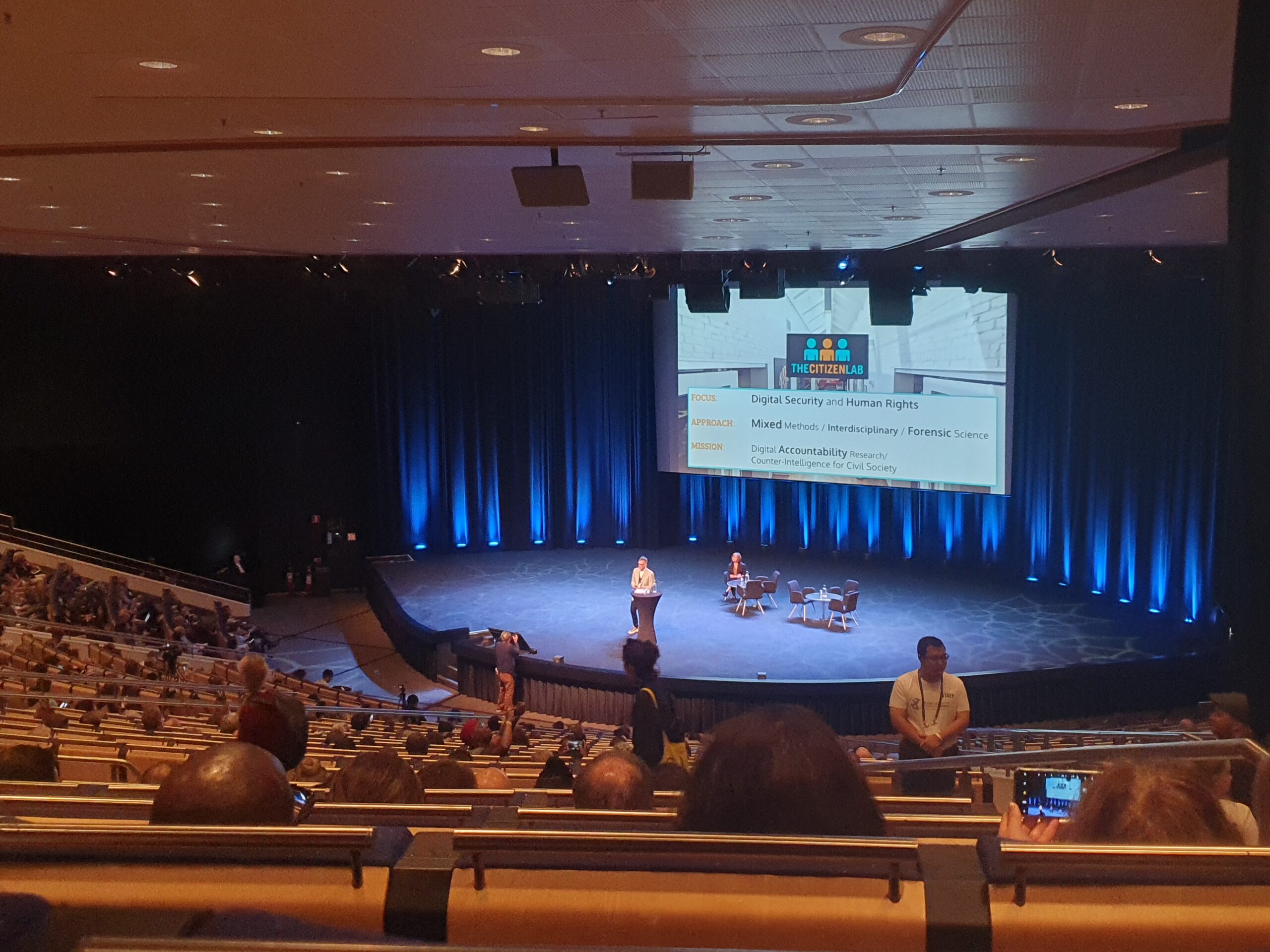
At the core of #GIJC23’s agenda were collaborative efforts, where attendees delved into insights from industry experts, tackling key issues such as AI threats, cyber espionage, propaganda campaigns, authoritarian regimes, and criminal dangers. Over four days, journalists engaged in knowledge-sharing, forging cross-border partnerships, and gaining courage to confront evolving challenges.
Emilia Diaz-Struck, the newly appointed Executive Director of the Global Investigative Journalism Network (GIJN), highlighted the challenging times for journalism, emphasizing the need for collaboration amidst threats like attacks, disinformation, and censorship. Diaz-Struct underscored the beacon of hope found in inspiring collaborations, the power of data, and the embrace of technology.
Various speakers, panelists, experts and participants’ contributions saw GIJC23 emerged as a crucible where investigative journalists not only adapted to a transformed world but also demonstrated the power of collaboration, resilience in the face of adversity, and the unwavering commitment to upholding the principles of a free press. The conference exemplified journalism’s pivotal role in navigating complexities, providing insights into evolving threats, and fostering a global community dedicated to truth and accountability.
Unmasking the Digital Shadows
The conference took a profound turn during the keynote address by Mr. Ron Deibert, the founder and director of the Citizen Lab cybersecurity research unit at the University of Toronto. Deibert exposed a multitude of covert surveillance threats driven by the emerging commercial espionage industry, rendering virtually every independent journalist and source worldwide vulnerable.
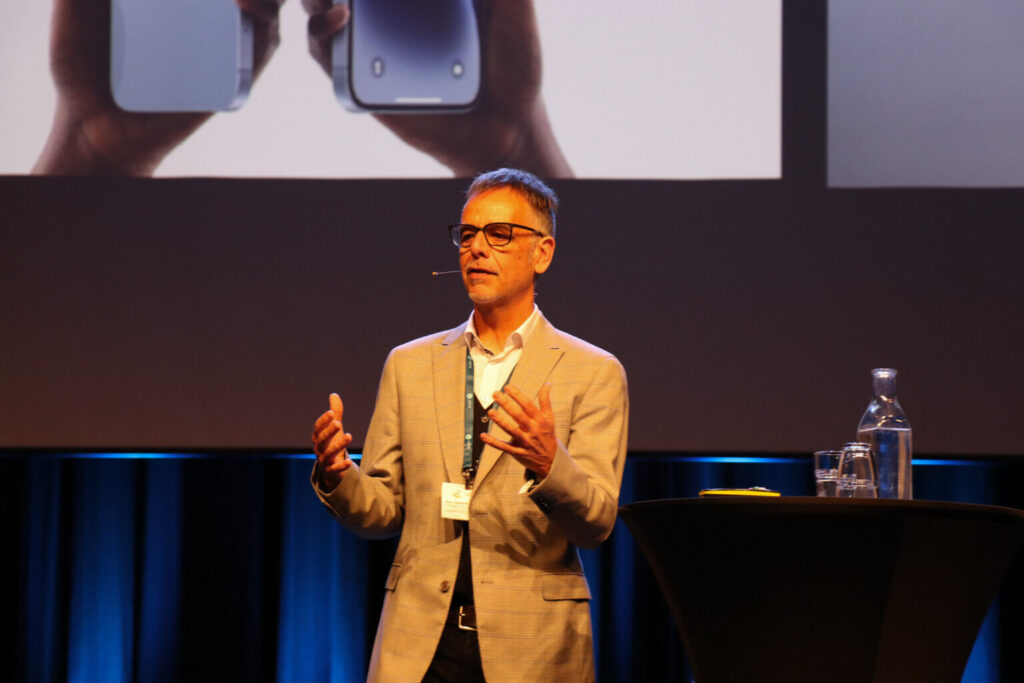
In his revelations, Deibert listed dangerous spyware and organizations responsible for various hacking threats against journalists. He shared insider accounts of Citizen Lab’s forensic work, unveiling covert spying on numerous journalists globally, including instances where reporters’ smartphone cameras were surreptitiously hijacked. Deploring the situation, Deibert highlighted that this threat extended beyond journalists to dissidents, civil society, or anyone targeted for attack. Shockingly, he emphasized that numerous democratic governments were enthusiastic clients of these unregulated mercenary surveillance firms.
Expressing deep concern about the current landscape, Deibert warned, “The ‘new normal’ is mercenary surveillance firms that are almost entirely unregulated, selling to the world’s worst sociopaths.” Despite this grim reality, he urged a collective reminder of the impact investigative reporting, responsible disclosures, and collaborative efforts can have. Deibert emphasized the importance of celebrating these collaborations, recognizing their significant role in countering the escalating threats posed by unregulated surveillance practices.
Preserving democracy
The GIJC23 spotlighted the distressing global trend of democratic erosion, revealing the growing concern over a surge in coups and the burgeoning alliances between elected autocrats, oligarchs, far-right groups, corrupt funders, and disinformation networks. This ominous scenario set the stage for a crucial panel discussion titled “Investigations to Save Democracy.” The panel, featuring prominent editors Lina Attalah, Vinod K. Jose, and Pulitzer Prize-winning David Cay Johnston, underscored the pivotal role investigative journalism plays in safeguarding democracies.
The consensus reached by the panelists and contributors was resounding: investigative journalists serve as the frontline guardians, preserving the health of democracies by going beyond conventional political reporting. Through collaborative reporting and partnerships between newsrooms, they illuminate critical aspects such as judicial independence, rule-breaking, the plight of marginalized groups, and the hidden forces influencing elections. The discussion emphasized the need for journalists to scrutinize the “termites” gradually eroding the foundations of democratic systems. At GIJC23, the imperative of investigative journalism in preserving democracy’s pulse emerged as a rallying call against the multifaceted threats challenging democratic values worldwide.
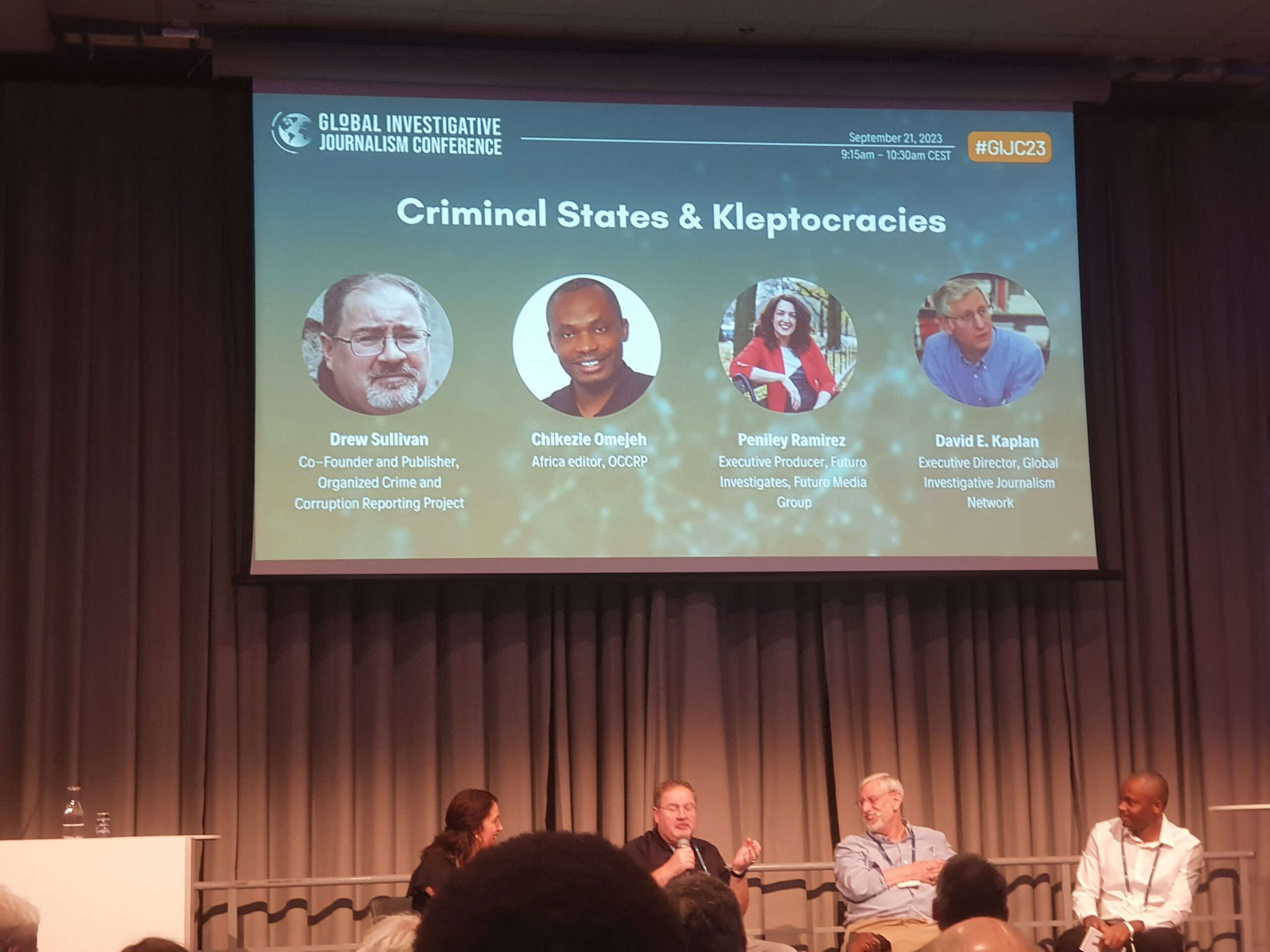
Navigating threats to election
Delving into the intricate landscape of electoral integrity, GIJC23 hosted a compelling panel discussion titled “Investigating Elections.” The session, skillfully moderated by Kenyan investigative journalist and Africa Uncensored CEO, John-Allan Namu, featured an esteemed lineup including Priyanjana Bengani, Senior Research Fellow at Columbia University’s Tow Center for Digital Journalism, and Juliana dal Piva, a columnist for UOL and an investigator at the CLIP (Latin American Center for Investigative Journalism).
The expert panel not only identified but also dissected the “big five threats” jeopardizing free and fair elections. Ranging from the influence of AI and tech companies to the role of electoral communication entities, echo chambers, the strategic advantage authoritarians gain even in defeat, and the grim specter of gender-based violence against journalists – the discussion unfolded strategies for journalists to counter these threats. Furthermore, the panel generously shared 10 invaluable tips and tools for investigative journalists diving into the complex realm of election reporting. This session served as a guiding beacon for journalists navigating the nuanced challenges surrounding electoral processes.
The art of undercover journalism
Exploring the intricacies of investigative journalism, a panel moderated by Brazilian journalist J. Fernando Rodrigues, featuring Naipanoi Lepapa, a freelance investigative journalist in Kenya, and Mamdouh Akbik, an investigative film producer for BBC Arabic, provided invaluable tips and best practices for journalists navigating the delicate terrain of undercover reporting.
The session, rich with ethical considerations, practical advice, and safety-related insights, served as a comprehensive guide for journalists contemplating or actively engaged in undercover work. Drawing from their experiences, the panelists shed light on the challenges and rewards of going undercover, emphasizing the need for meticulous planning and ethical considerations.
Diana Cariboni, the Latin America editor for openDemocracy, further contributed to the discourse, highlighting the non-natural nature of undercover journalism. She underscored crucial reasons reporters might opt for undercover approaches, including avoiding exposure to harassment from centers being investigated, navigating the dangerous legal status of abortion inquiries in various countries, and facilitating global-scale operations without compromising the investigation. The session offered a rare glimpse into the world of undercover journalism and equipped journalists with essential insights to navigate its complexities.
Unveiling the global web of money laundering
Delving into the complex realm of financial investigations, the panel on “Following the Money” exposed the evolving tactics of criminals and the sophistication of money laundering operations. The session, featuring Alia Ibrahim from DARAJ, Musikilu Mojeed from The Premium Times, Paul Radu from OCCRP, and moderated by Martha Steffens from the University of Missouri, brought to light alarming statistics – global money laundering accounting for an estimated 2 to 5% of the world’s GDP ($800 billion – $2 trillion).
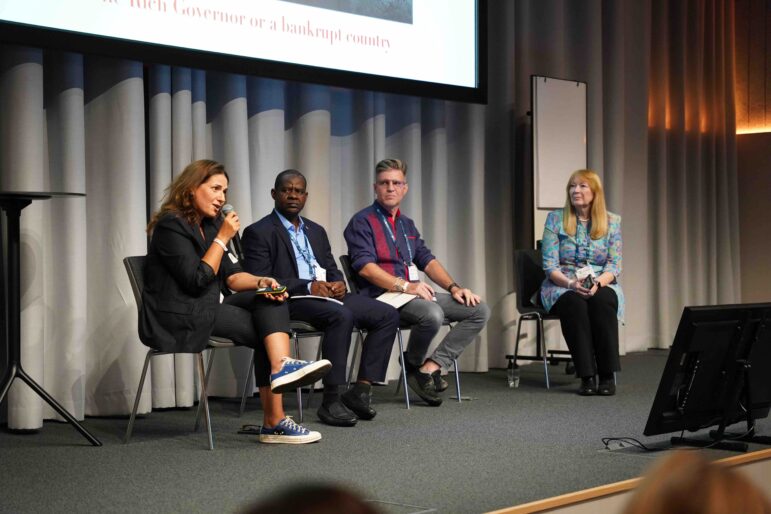
The experts shared insights gleaned from their experiences, unveiling the various strategies employed by criminals and corrupt officials to conceal the proceeds of illegal activities. The discussion unfolded as a compelling “follow the money” narrative, urging investigative reporters to adopt a criminal mindset and strategic thinking. The panelists emphasized the importance of meticulous scrutiny, considering court cases, cultivating internal sources, seeking collaborative assistance, utilizing open databases, and scrutinizing every document line-by-line to uncover the trails and mistakes of criminals. The session served as a masterclass for investigative journalists aiming to navigate the intricate landscape of financial investigations.
The triumphs and challenges of women investigative reporters
In a compelling session titled “Women Investigative Reporters,” the spotlight shifted to the formidable journeys of women in investigative journalism, unveiling the hurdles and biases they navigate globally. The diverse panel, featuring Oksana Brovko, Gina Chua, Purity Mukami, Kamilla Marton, Jessica Ziegerer, Hui (Lulu) Ning, Zahra Nader, and Emilia Díaz-Struck, emphasized the pivotal role of supportive networks and communities. The panelists shared experiences, shedding light on the collaborative power that propels women in investigative journalism to thrive.
As Diaz-Struck aptly stated, “It takes the power of collaboration to help us thrive.” Gina Chua added a poignant note, highlighting the evolving landscape where the decision-makers shaping the focus of investigative journalism are increasingly diversifying, marking a positive shift away from the historical male-dominated narrative. This session celebrated the strength, resilience, and collaborative spirit of women investigative reporters, inspiring a new era of inclusivity and empowerment within the field.
The synergy of investigative journalism and scientific inquiry
In a thought-provoking session, the intersection of investigative journalism and scientific expertise emerged as a potent force for societal good. The collaborative potential was underscored, showcasing how this fusion could elevate scientific literacy, unveil critical public health issues, and craft compelling investigations. The importance of reciprocity in collaborations was emphasized — journalists not only extracting knowledge but also contributing valuable insights to scientists.
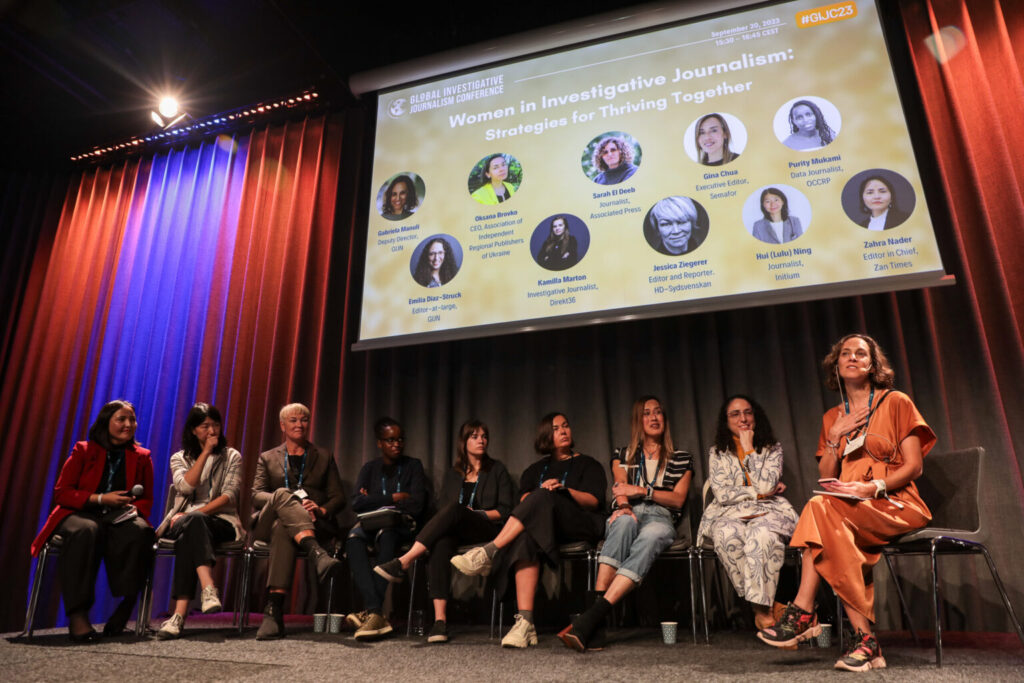
This theme reverberated throughout various sessions, including dedicated discussions on Africa, the Russia-Ukraine War, climate change, human rights, and journalist safety. It illuminated a broader narrative of cross-disciplinary cooperation, demonstrating the profound impact that emerges when investigative journalists and scientists join forces to address multifaceted global challenges.
The social side of GIJC23
Amidst the weighty discussions on corruption, money-laundering, climate change, oligarchs, and war crimes, GIJC23 embraced a vibrant social dimension, providing participants with opportunities to unwind and foster connections beyond the conference sessions. A range of socializing and networking events infused the gathering with a sense of camaraderie and relaxation, including performances by the conference’s in-house band, The Muckrakers, savoring Swedish foods, cultural exploration, music, and plenty of dancing.
One standout evening featured the announcement of the Global Shining Light Awards winners—an emotional highlight after a hiatus since 2019. The awards recognized exceptional investigative work uncovering issues such as illegal mining in Venezuela, systemic banditry in northwestern Nigeria, secret prisons in Bangladesh, police brutality in South Africa, mass graves in Izium, Ukraine, and COVID-19 profiteering in North Macedonia. Congratulations to all the honorees.
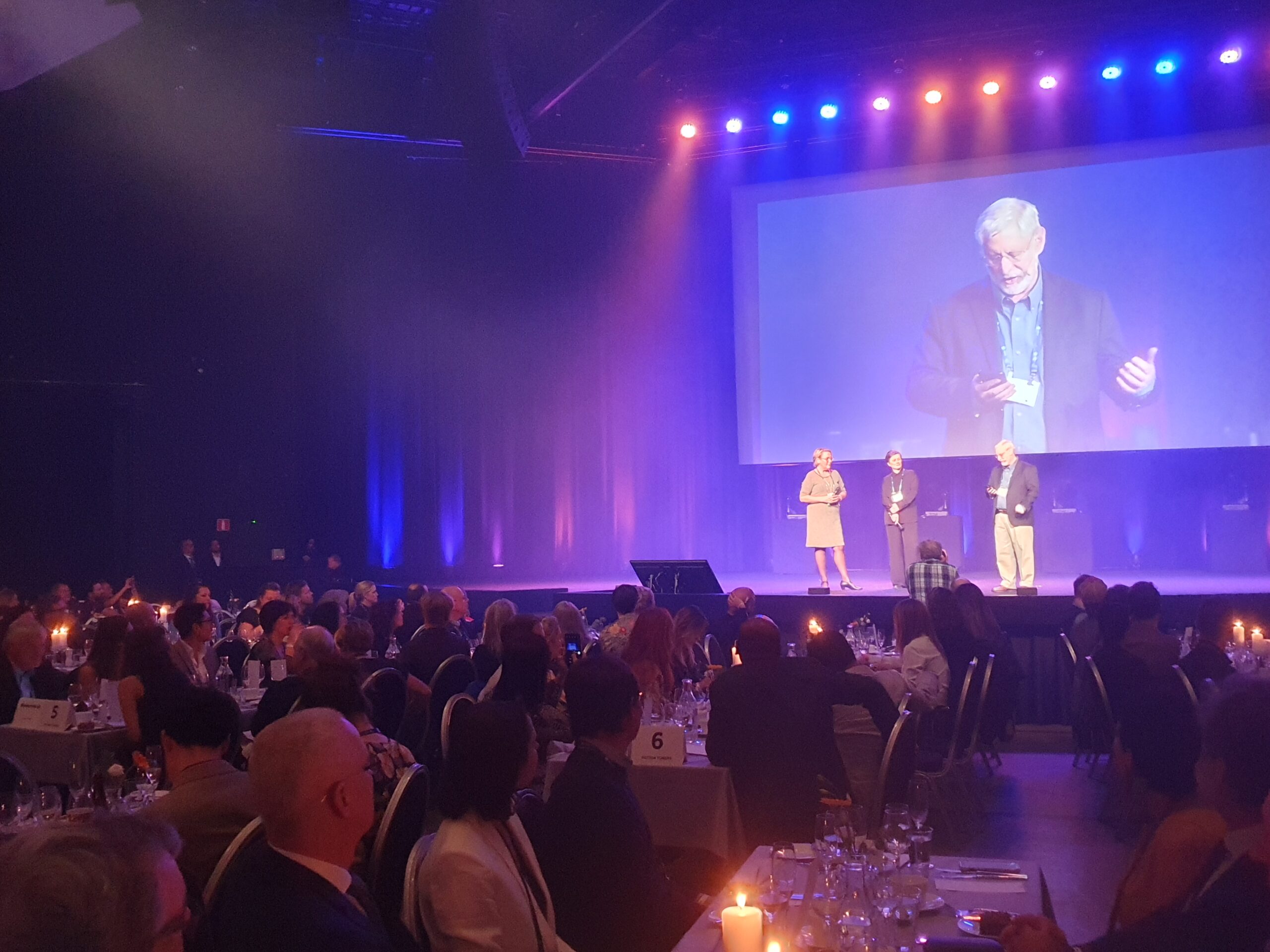
The emotionally charged Thursday night marked the farewell to outgoing Executive Director David Kaplan, who had steered the organization since 2013. At the gala dinner event, David passed the baton to GIJN’s new executive director, Emilia Diaz-Struck. In her first official remarks, Diaz-Struct captured the socially-friendly atmosphere, stating:
“As we dance to this music, our dancing shoes are the GIJN, a community that spans over 240 member organizations across the globe. These shoes signify more than just a desire to investigate; they demand a realistic understanding of the need for security and the importance of collaborative journalism. In a world where governments attempt to silence journalists, the strength of our global investigative journalism community lies in standing together—more than 2,000 journalists strong, affirming that we are not alone.”
“These dancing shoes empower us to fortify our community, leading to remarkable investigations celebrated today. As we mark our 20th anniversary, honoring award winners and the global investigative journalism community, we acknowledge the transformative impact of investigative work, holding power accountable and bringing transparency to the forefront. Let’s put on our dancing shoes tonight and celebrate these achievements.”
Emilia Diaz-Struck vision for GIJN
In an exclusive interview with Global Sentinel, Emilia Diaz-Struck, following her official assumption of office at the helm of the GIJN, provided a comprehensive overview of her strategic vision for the organization. Having transitioned from her role as Editor-at-Large, Diaz-Struck expressed a profound sense of honor and responsibility in steering GIJN’s future. Her leadership philosophy revolves around the pivotal elements of listening, planning, and decisive action to propel the organization forward.
Reflecting on her unique background as a Venezuelan woman, Diaz-Struck reframed challenges as advantages. Leveraging her extensive career, marked by groundbreaking global investigations and collaboration on the Pulitzer-Prize-winning Panama Papers, she emphasized the value her Venezuelan Latina identity brings to the role. Her goal is to harness these diverse experiences to effectively navigate challenges and foster collaboration within the global investigative journalism community.
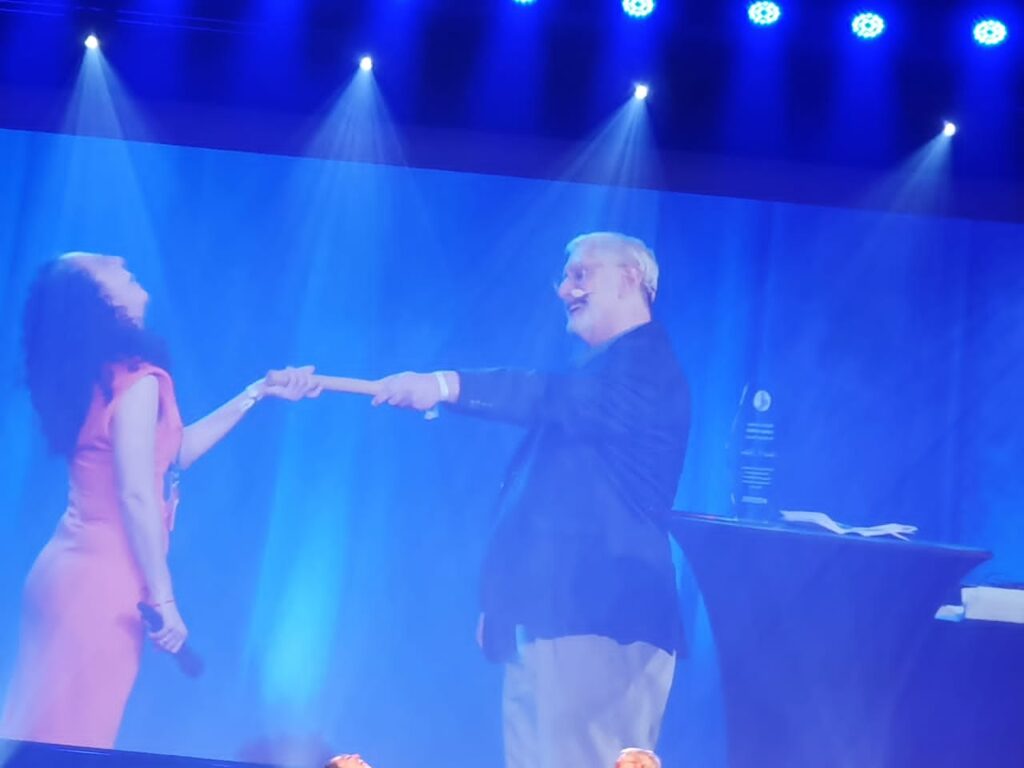
Diaz-Struck outlined specific initiatives for Africa, including the establishment of dedicated regional editors and plans to bolster investigative journalism through conferences and resource development. Sharing insights gleaned from the GIJC 2023, she underscored the imperative to address evolving threats, enhance editorial training, and integrate emerging technologies into investigative journalism practices. In conclusion, Diaz-Struck reaffirmed GIJN’s commitment to combat misinformation, champion transparency, and confront global issues like insecurity, climate change, and human rights through a strategic blend of training, collaboration, and community engagement.
GIJC23 at a glance
…Global confluence of insight and collaboration
The 13th Global Investigative Journalism Conference (GIJC23) convened over 2,100 journalists from 132 countries, offering a panoramic view of the challenges and triumphs in investigative journalism. Against the backdrop of a rapidly changing world marked by a pandemic, geopolitical shifts, and technological advancements, the conference spotlighted key themes and insights.
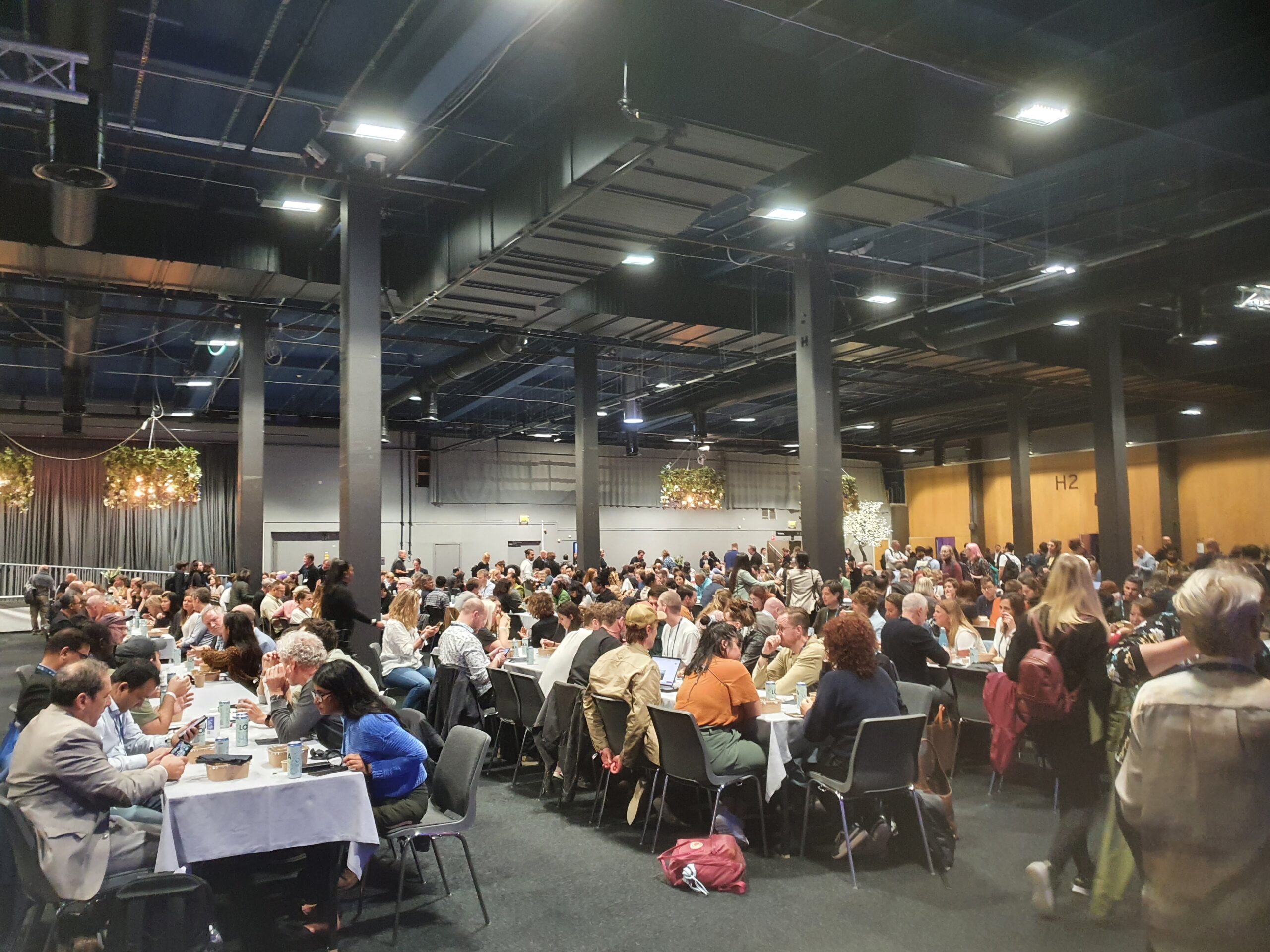
1. Collaboration as a Cornerstone: A recurring theme was the power of collaboration in facing challenges such as attacks on journalism, disinformation, and censorship. Diaz-Struck emphasized the resilience forged through collaborative efforts, celebrating inspiring partnerships, the potency of data, and the embrace of technology.
2. Emerging Threats and Vigilance: Ron Deibert’s keynote address highlighted the escalating threats posed by covert surveillance in the age of an unregulated commercial espionage industry. He underscored the vulnerability of journalists globally, revealing the alarming scope of spyware activities and the complicity of democratic governments in fueling these threats.
3. Safeguarding Democracy: The conference delved into the worrying erosion of democracy worldwide, with an emphasis on the rising alliance between elected autocrats, oligarchs, far-right groups, corrupt funders, and disinformation networks. Investigative journalism emerged as a crucial guardian of democracy, going beyond political reporting to illuminate judicial independence, rule-breaking, marginalized groups, and hidden forces influencing elections.
4. Protecting the Electoral Process: Sessions on “Investigating Elections” offered valuable insights into safeguarding free and fair elections. From combating AI and tech threats to addressing gender-based violence against journalists, the discussions provided a toolkit for journalists to navigate the complexities of electoral reporting.
5. Navigating Undercover Journalism: Practical tips and ethical considerations for undercover journalism were shared, emphasizing the importance of safety and strategic approaches. Diana Cariboni’s perspective highlighted the necessity of going undercover for reasons such as avoiding exposure, navigating legal complexities, and operating on a global scale without compromising investigations.
6. Tracing Illicit Finances: A dedicated panel on “Following the Money” revealed the intricate web of global money laundering, urging investigative journalists to think like criminals and companies to unravel financial trails. The estimated 2 to 5% of global GDP involved in money laundering highlighted the magnitude of the challenge.
7. Women in Investigative Journalism: The session on “Women Investigative Reporters” shed light on the hurdles women face globally, emphasizing the importance of collaborative networks. Diaz-Struct, along with other panelists, emphasized the evolving landscape where women increasingly influence the focus of investigative journalism.
8. Leadership and Vision: Emilia Diaz-Struck’s vision for GIJN, outlined in a concluding interview, showcased her commitment to harnessing diverse experiences, fostering collaboration, and addressing regional needs, particularly in Africa. The commitment to combating misinformation and championing transparency underscored the organization’s dedication to confronting global challenges.
In summary, GIJC23 served as a crucible of insight, collaboration, and strategic foresight. It illuminated the evolving landscape of investigative journalism, underscored the importance of safeguarding democracy, and provided practical tools for journalists to navigate a complex and rapidly changing world. As the global journalism community continues to face multifaceted challenges, GIJC23 stands as a testament to the resilience, adaptability, and collective strength of investigative journalism on the world stage.

